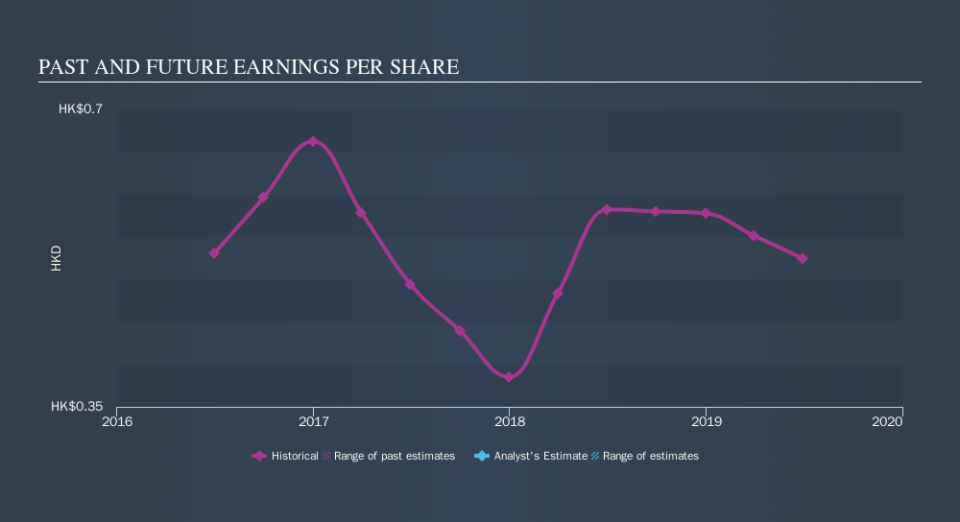Those Who Purchased Keck Seng Investments (Hong Kong) (HKG:184) Shares Five Years Ago Have A 37% Loss To Show For It

In order to justify the effort of selecting individual stocks, it's worth striving to beat the returns from a market index fund. But every investor is virtually certain to have both over-performing and under-performing stocks. So we wouldn't blame long term Keck Seng Investments (Hong Kong) Limited (HKG:184) shareholders for doubting their decision to hold, with the stock down 37% over a half decade. And some of the more recent buyers are probably worried, too, with the stock falling 25% in the last year. Unhappily, the share price slid 2.1% in the last week.
Check out our latest analysis for Keck Seng Investments (Hong Kong)
To quote Buffett, 'Ships will sail around the world but the Flat Earth Society will flourish. There will continue to be wide discrepancies between price and value in the marketplace...' One flawed but reasonable way to assess how sentiment around a company has changed is to compare the earnings per share (EPS) with the share price.
During the five years over which the share price declined, Keck Seng Investments (Hong Kong)'s earnings per share (EPS) dropped by 12% each year. The share price decline of 8.8% per year isn't as bad as the EPS decline. So investors might expect EPS to bounce back -- or they may have previously foreseen the EPS decline.
The company's earnings per share (over time) is depicted in the image below (click to see the exact numbers).
Dive deeper into Keck Seng Investments (Hong Kong)'s key metrics by checking this interactive graph of Keck Seng Investments (Hong Kong)'s earnings, revenue and cash flow.
What About Dividends?
When looking at investment returns, it is important to consider the difference between total shareholder return (TSR) and share price return. The TSR incorporates the value of any spin-offs or discounted capital raisings, along with any dividends, based on the assumption that the dividends are reinvested. It's fair to say that the TSR gives a more complete picture for stocks that pay a dividend. As it happens, Keck Seng Investments (Hong Kong)'s TSR for the last 5 years was -29%, which exceeds the share price return mentioned earlier. And there's no prize for guessing that the dividend payments largely explain the divergence!
A Different Perspective
Investors in Keck Seng Investments (Hong Kong) had a tough year, with a total loss of 22% (including dividends) , against a market gain of about 0.9%. Even the share prices of good stocks drop sometimes, but we want to see improvements in the fundamental metrics of a business, before getting too interested. Regrettably, last year's performance caps off a bad run, with the shareholders facing a total loss of 6.5% per year over five years. We realise that Buffett has said investors should 'buy when there is blood on the streets', but we caution that investors should first be sure they are buying a high quality businesses. If you would like to research Keck Seng Investments (Hong Kong) in more detail then you might want to take a look at whether insiders have been buying or selling shares in the company.
Of course Keck Seng Investments (Hong Kong) may not be the best stock to buy. So you may wish to see this free collection of growth stocks.
Please note, the market returns quoted in this article reflect the market weighted average returns of stocks that currently trade on HK exchanges.
We aim to bring you long-term focused research analysis driven by fundamental data. Note that our analysis may not factor in the latest price-sensitive company announcements or qualitative material.
If you spot an error that warrants correction, please contact the editor at editorial-team@simplywallst.com. This article by Simply Wall St is general in nature. It does not constitute a recommendation to buy or sell any stock, and does not take account of your objectives, or your financial situation. Simply Wall St has no position in the stocks mentioned. Thank you for reading.

